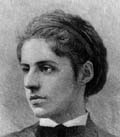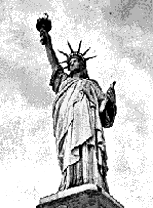 |
| Emma Lazarus (http://jwa.org/exhibits /wov/lazarus/) |
A hero can be anyone. You can’t recognize a hero from the way that person looks; it is circumstance and the hero’s actions in that situation which labels them a hero. A hero is a person you look up to, and that person is different for everyone. For me, that person is Emma Lazarus. Emma Lazarus was a well known poet, who fought for immigrant’s rights. She expressed herself through poetry, and had an effect on the people around her. Lazarus is best known for her poem, The New Colossus, which is now inscribed on the Statue of Liberty. It is her creativity, perseverance, and inspiration in what she did that makes her a hero.
Emma Lazarus was the fourth of seven children in her family. Although her family had lived in New York for a long time, they were originally Portuguese Sephardic Jews. Lazarus’ father hoped to integrate his family into the Christian society, at a time when the feeling of Anti-Antisemitism (or hate against Jews) was rising in Europe. Her family became shunned by relatives for not observing Jewish traditions. Although Lazarus’ family ran with a wealthy crowd, there was still an undercurrent of prejudice that Emma was always aware of.
Emma Lazarus studied European and American literature, and several languages from an early age. Her father saw talent in her, and when Emma was 17, he secretly published a collection of her poems. The collection caught Ralph Waldo Emerson’s eye, and Lazarus and Emerson remained in correspondence throughout their lives.
Later in her life Emma Lazarus became inspired by her ethnicity and religion. She began writing articles on Judaism, and translating Jewish works. Some works such as Admetus and Other Poems, The Spagnoletto: A Drama in Verse, and Songs of a Semite, reflect her pride in her culture. Although Lazarus wrote many other collections, she is most known for those that are focused on Judaism.
As Anti-Semitism came closer to her home by persecuted Jewish immigrants; Lazarus spoke up for the rights of the immigrants. She wrote many powerful poems to express herself and put her point across well. Because her popularity enabled her to reach a wide audience, she became a dedicated spokesperson of the American Jewish community. In magazines she rallied against international anti-Semitism as well as the false stereotypes that fostered dangerous prejudice against Jews everywhere- even in America.
In 1882, Emma Lazarus began what would become her most famous poem: The New Colossus. Little did she know, that her poem would one day be inscribed on the Statue of Liberty. The poem’s powerful prose comes from her compassion and drive to achieve a society that accepted Jews. It also showed how the sight of America affected immigrants, and the irony of their reception into society.
Emma Lazarus is my hero because she wasn’t afraid to speak up in what she believed in. I believe that it took a lot of courage to express herself in a time where people didn’t respect her culture. In a book I am reading in school, The Hero’s Trail by T.A Barron, there are five types of heroes: “hero on the spot”, “survivor hero”, “hero within”, “hero on the spot” and “hero for all time”. I believe that Emma Lazarus was a “hero within”: she knew what was right, and instead of hoping for things to get better, she took action herself. I think that Emma Lazarus exemplifies a hero in her qualities of determination, and a moral conscience, and that is why she is my hero
 |
.
The New Colossus
Not like the brazen giant of Greek fame,
With conquering limbs astride from land to land;
Here at our sea-washed, sunset gates shall stand
A mighty woman with a torch, whose flame
Is the imprisoned lightning, and her name
Mother of Exiles. From her beacon-hand
Glows world-wide welcome; her mild eyes command
The air-bridged harbor that twin cities frame.
"Keep, ancient lands, your storied pomp!" cries she
With silent lips. "Give me your tired, your poor,
Your huddled masses yearning to breathe free,
The wretched refuse of your teeming shore.
Send these, the homeless, tempest-tost to me,
I lift my lamp beside the golden door!"
Emma Lazarus, 1883
Page created on 4/1/2013 5:00:49 PM
Last edited 1/6/2017 7:34:39 PM
